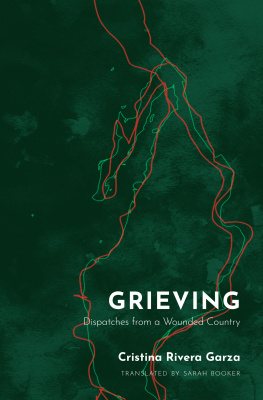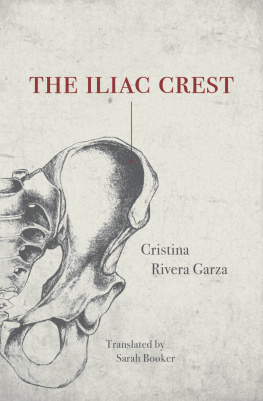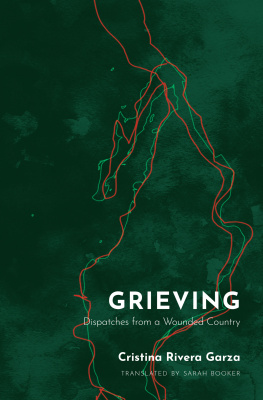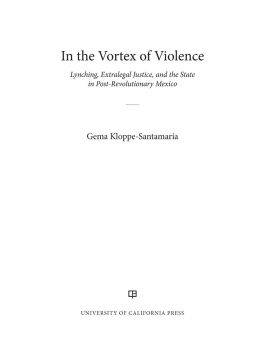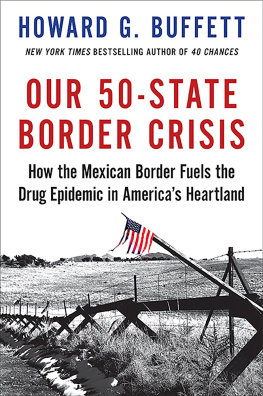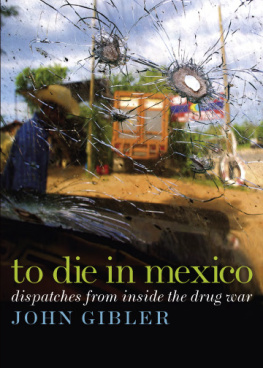
GRIEVING
Dispatches from a Wounded Country
Cristina Rivera Garza
TRANSLATED FROM THE SPANISH
BY SARAH BOOKER

Published in 2020 by the Feminist Press
at the City University of New York
The Graduate Center
365 Fifth Avenue, Suite 5406
New York, NY 10016
feministpress.org
First Feminist Press edition 2020
Dolerse: Textos desde un pas herido copyright 2011 by Cristina Rivera Garza
The Morning After copyright 2016 by Cristina Rivera Garza
On Our Toes: Women against the Mexican Femicide Machine and The End of Womens Silence copyright 2019 by Cristina Rivera Garza
I Wont Let Anyone Say Those Are the Best Years of Your Life, Writing in Migration, and Touching Is a Verb copyright 2020 by Cristina Rivera Garza
Translation copyright 2020 by Sarah Booker
All rights reserved.

| This book was made possible thanks to a grant from New York State Council on the Arts with the support of Governor Andrew M. Cuomo and the New York State Legislature. |
No part of this book may be reproduced, used, or stored in any information retrieval system or transmitted in any form or by any means, electronic, mechanical, photocopying, recording, or otherwise, without prior written permission from the Feminist Press at the City University of New York, except in the case of brief quotations embodied in critical articles and reviews.
First printing October 2020
Cover design by Sukruti Anah Staneley
Text design by Drew Stevens
Library of Congress Cataloging-in-Publication Data
Names: Rivera Garza, Cristina, 1964- author. | Booker, Sarah, translator.
Title: Grieving : dispatches from a wounded country / Cristina Rivera Garza ; translated from the Spanish by Sarah Booker.
Description: First Feminist Press edition. | New York, NY : Feminist Press, 2020. | Includes bibliographical references.
Identifiers: LCCN 2020026940 (print) | LCCN 2020026941 (ebook) | ISBN 9781936932931 (paperback) | ISBN 9781936932948 (ebook)
Subjects: LCSH: Rivera Garza, Cristina, 1964Translations into English. | MexicoSocial conditions21st centuryTranslations into English.
Classification: LCC PQ7298.28.I8982 A2 2011 (print) | LCC PQ7298.28.I8982 (ebook) | DDC 868/.703dc23
LC record available at https://lccn.loc.gov/2020026940
LC ebook record available at https://lccn.loc.gov/2020026941
PRINTED IN THE UNITED STATES OF AMERICA
Contents
INTRODUCTION
Taking Shelter: Horror, the State, and Social Suffering in Twenty-First-Century Mexico
On September 14, 2011, we awoke once again to the image of two bodies hanging from a bridge. One man, one woman. He, tied by the hands. She, by the wrists and ankles. Just like so many other similar occurrences, and as noted in newspaper articles with a certain amount of trepidation, the bodies showed signs of having been tortured. Entrails erupted from the womans abdomen, opened in three different places.
It is difficult, of course, to write about these things. In fact, the very reason acts like these are carried out is so that they render us speechless. Their ultimate objective is to use horror to paralyze completelyan offense committed not only against human life but also, above all, against the human condition.
In Horrorism: Naming Contemporary Violencean indispensable book for thinking through this reality, as understanding it is almost impossibleAdriana Cavarero reminds us that terror manifests when the body trembles and flees in order to survive.transcend it. Confronted with Medusas decapitated head, a body destroyed beyond human recognition, the horrified part their lips and, incapable of uttering a single word, incapable of articulating the disarticulation that fills their gaze, mouth wordlessly. Horror is intrinsically linked to repugnance, Cavarero argues. Bewildered and immobile, the horrified are stripped of their agency, frozen in a scene of everlasting marble statues. They stare, and even though they stare fixedly, or perhaps precisely because they stare fixedly, they cannot do anything. More than vulnerablea condition we all experiencethey are defenseless. More than fragile, they are helpless. As such, horror is, above all, a spectaclethe most extreme spectacle of power.
What we Mexicans have been forced to witness at the beginning of the twenty-first centuryon the streets, on pedestrian bridges, on television, or in the papersis, without a doubt, one of the most chilling spectacles of contemporary horror. Bodies sliced open from end to end, chopped into unrecognizable pieces, left on the streets. Bodies exhumed in a state of decay from hundreds upon hundreds of mass graves. Bodies tossed from pickup trucks onto crowded streets. Bodies burned on enormous pyres. Bodies without hands or without ears or without noses. Disappeared bodies, unable to claim their suitcases from the bus stations where their belongings have arrived. Persecuted bodies, bodies without air, bodies without fingernails or eyelashes. This is the very essence of horror. This is a more current version of a kind of modern horror that has shown its atrocious face in Armenia, in Auschwitz, in Kosovo.
In the case of Mexico at the end of the twentieth century and beginning of the twenty-first, horror is intimately tied to a misnamed warthe military conflict escalated by President
State is a verb, not a noun; state, like capital, is a relationship. In a unilateral move in the beginning of the twenty-first century, the Mexican state, administered by an enthusiastic generation of Ivy Leagueeducated technocrats convinced of the supremacy of profit above life, withdrew protection and care for the bodies of its peoples, thus creating, in Giorgio Agambens terms, the open.vulnerablea regular mode of the human conditionto helplessan artificial state caused by torture. In its indifference and neglect, in its intricate understanding of the political and even the public, in its indolence, the Visceraless State thus produces the eviscerated body: those chunks of torsos, those legs and feet, that interior that becomes exterior, hanging.
In a lucid essay about what is wrong with the world today, humanist Tony Judt compares the level of aggression and neglect that people suffer at the hands of the totalitarian state to societies where state insufficiencies allow impunity and violence. The latter, without a doubt, is the case in Mexico. A telling clue was revealed in one of former Mexican president Vicente Foxs on-air interviews. Why should I care? he said, directly referring to a dispute involving TV stations, but indirectly betraying his ideas about social well-being and the role of the state in social and cultural matters. Why should I care? said the then-president of Mexico in a cynical tone, chilling even today. With such a careless phrase, he solidified the tone of Mexicos particular form of contemporary horrorism.
In close complicity with the members of the executive and judicial branches of the Mexican government, the fierce businessmen of our postmodern, globalized societythe narcohave conspired, with organic if not filial speed, to form a Pontius Pilate state. A product in some cases of the inequalities and hierarchies of an economic system based on dispossession and extraction, the narco has strategically and successfully worked for decades to validate itself as an essential entity in our everyday lives. The corridos and narco novels of this early period often presented a sympathetic portrait of men who grew up in poverty only to become Robin Hood types that provided for their communities when society was not able to or not interested in doing so. Newspaper articles Government corruption along with the narcos signature executions demonstrate what was once easy to deny: drug lords are businessmen prepared to go as far as necessarywhich frequently means that space where the human condition endsin order to ensure and, above all, increase their profits.
Next page
